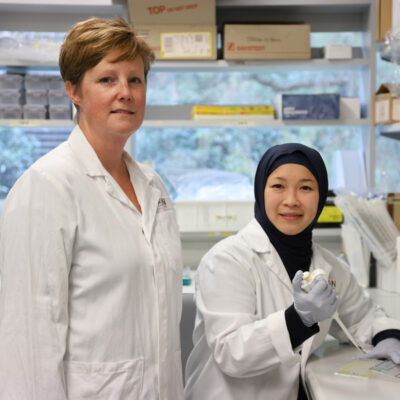Preparing for the next pandemic
By Hudson Institute communications
Leading virus scientist, Associate Professor Michelle Tate explains why new treatments are needed alongside vaccines.

A/Prof Michelle Tate is a world-leading expert in influenza and innate immune responses. Michelle’s research is focused on finding new treatments to help patients with severe COVID-19 and viral infections like influenza. She has spent much of her career researching hyperinflammation and severe disease, particularly during influenza A virus infection.
In 2017, Michelle predicted a future pandemic remarkably similar to COVID-19. She hopes to develop drugs to fight hyperinflammation in time for what she believes will be the next pandemic – influenza.
Michelle is one of more than 100 leading inflammation researchers at Hudson Institute – the largest group in Australia – who could accelerate this vital research.
Here, Michelle explains why this is so important.
Tell us a bit about your influenza (flu) research
My expertise is in influenza research and how we can develop drugs to target our body’s damaging inflammation to help limit life-threatening disease.
Inflammation is important because it helps remove infection from our system. However, during severe or fatal disease our immune system overreacts, resulting in hyperinflammation.
We are working out the difference between an immune response that’s beneficial, versus one that is actually detrimental, causing disease.
Can you describe the kinds of drugs needed?
When the next pandemic hits, we need to have cost-effective drugs that can be administered easily, don’t cause severe side effects and could be broadly used for any virus and on any age group.
You’ve been predicting another pandemic – what do you think it will be?
It’s really hard to predict exactly what the next pandemic virus will be. COVID-19 was unexpected, but I think the next pandemic will most likely be a form of bird flu. Highly pathogenic influenza viruses currently circulate in wild birds and they have infected humans with mortality rates as high as 60 per cent. It is only a matter of time until bird flu acquires the ability to spread through our community.
We actually don’t have any drugs available that we can use to treat severe flu. We would have to make a new vaccine, which would take time, so we really need drugs that we can use to treat the disease in the time between when the pandemic starts, and when a vaccine is ready.
Why is inflammation so important during coronavirus infection? What does this mean for new pandemics?
While my research is in influenza, there are many similarities with COVID, and the outcomes could provide treatments for any pandemic-type disease caused by hyperinflammation – such as COVID-19 and its aftermath, ‘long COVID’.
We’re just starting to understand long COVID and the long-term and potentially permanent health issues seen in some patients. These are, at least in part, likely due to the inflammatory damage caused by the immune response to COVID infection.
Research on the inflammatory response to this, and other pandemic viruses is critical to finding new treatments to limit the impact of severe viral infections.
New study identifies influenza treatment
“The Viral Immunity and Immunopathology laboratory at Hudson Institute is unravelling why people get very sick from the flu. Specifically, we are examining the mechanisms involved in inducing a damaging hyperinflammatory response, and how this can be dampened with new drugs to treat the disease,” Michelle says.
“Our recent study has identified a highly inflammatory cytokine called IL-1β which promotes hyperinflammation and is a potential therapeutic target for influenza. While previous studies have detected high levels of IL-1β in the lungs of infected patients, our study was the first to specifically demonstrate IL-1β plays a detrimental role in promoting severe influenza disease.”
The study was published in the journal Immunology and Cell Biology.
What is inflammation?
Aside from COVID-19, inflammation underlies many diseases including long-term inflammatory illnesses such as rheumatoid arthritis, inflammatory bowel disease and multiple sclerosis. Inflammation is also a major contributing factor in the development of many other common diseases such as cancer, diabetes, heart disease and stroke.
Contact us
Hudson Institute communications
t: + 61 3 8572 2761
e: communications@hudson.org.au
About Hudson Institute
Hudson Institute’ s research programs deliver in three areas of medical need – inflammation, cancer, women’s and newborn health. More
Hudson News
Get the inside view on discoveries and patient stories
“Thank you Hudson Institute researchers. Your work brings such hope to all women with ovarian cancer knowing that potentially women in the future won't have to go through what we have!”







